On one level, the theme for Teachers College’s 2018 Academic Festival was simple: “X,” marking the 10th anniversary of TC’s signature homecoming event.
On another, it was an elegant expression of “a symbolic crossroads – a joining of paths in a moment of societal crisis, change and new opportunity,” as TC President Susan Fuhrman told listeners at the opening ceremony in Cowin Auditorium on Saturday, April 7th.
TOUCHED BY TRIBUTE President Susan Fuhrman, who will step down at the end of June, received a standing ovation from a capacity crowd at Academic Festival.
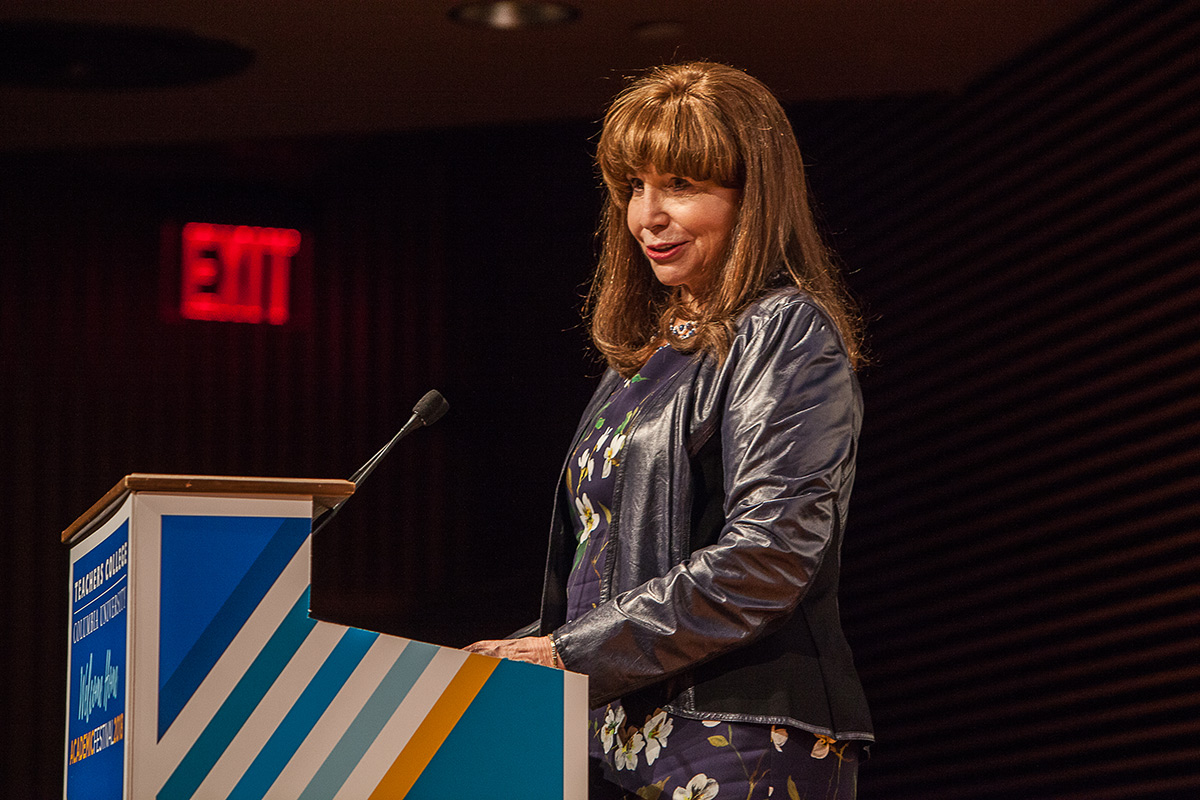
TOUCHED BY TRIBUTE President Susan Fuhrman, who will step down at the end of June, received a standing ovation from a capacity crowd at Academic Festival.
With the College itself at something of a crossroads — Fuhrman is concluding her 12-year presidency at the end of June — more than 1,000 alumni, friends and prospective students turned out for the biggest and most ambitious Festival to date. They gave Fuhrman a standing ovation, prompting her to respond that “It’s hard to give a speech when you’re crying,” and alumna and President’s Advisory Council member Charo Uceda (M.A. ’08) personally presented her with a generous contribution to the recently established, which supports students who “embrace a multidisciplinary approach in their work.”
The day reflected Fuhrman’s imprimatur on many levels, beginning with a breakfast for Golden Alumni (those who graduated 50 years ago or more) and a video recapping the history of Academic Festival, an event launched in 2008 by Fuhrman, Vice President for Development & External Affairs Suzanne Murphy and Senior Director of Alumni Relations Rosella Garcia. Past themes have included personal wellness, technology and learning, marrying the arts to the STEM disciplines, and making an impact through research.
In line with Fuhrman’s oft-expressed philosophy, this year’s program was emphatically multi- and cross-disciplinary, bringing together faculty, students and alumni across fields and departments for on topics that included gun violence; managing one’s own health; applying new research findings to teaching, responding to the global refugee crisis, and creating a pedagogy for social justice. At midday, each academic department also held its own showcase for newly admitted students, for whom the weekend was a chance to visit the College and, hopefully, as Fuhrman put it, “seal the deal.”
In addition, this year’s , by Eric Liu, who also received the President’s Medal of Excellence, was on civic education, which Fuhrman has made a TC priority. Liu, founder of Citizen University and best-selling author of You're More Powerful Than You Think: A Citizen's Guide to Making Change, energized the room with his message that power is not zero-sum. Organizing people unleashes their power to mobilize for just outcomes, he argued – and never more so than right now. For example, educators, whose recent mobilizations in West Virginia, Kentucky and Oklahoma suggest they are once again flexing their own political muscle, have a central role to play in unleashing students’ power in the service of democracy.
Titled "X", the College's 10th Academic Festival addressed “a symbolic crossroads – a joining of paths in a moment of societal crisis, change and new opportunity,
”said TC President Susan Fuhrman.
TIME TRAVELERS Golden Alumni gathered for an early breakfast at Academic Festival.
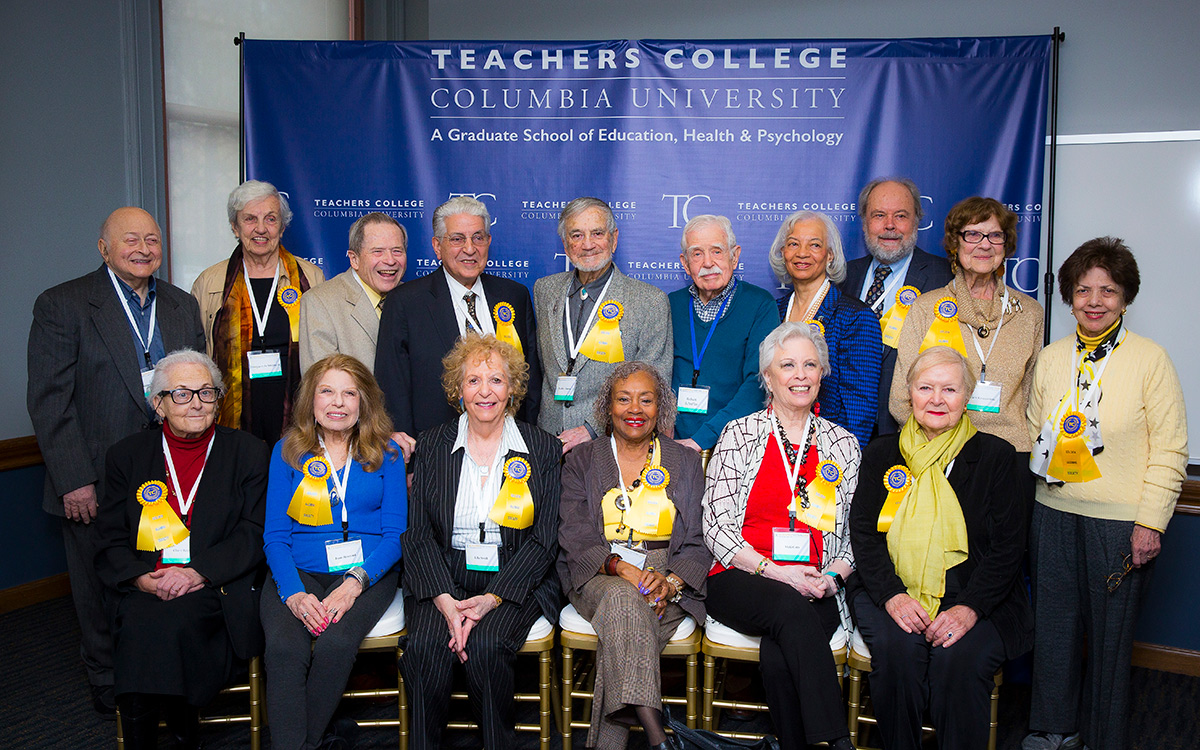
TIME TRAVELERS Golden Alumni gathered for an early breakfast at Academic Festival.
“Every teacher is a civics teacher,” Liu said. “If you are not teaching power as an educator, you are committing professional malpractice.”
That message was underscored by Sybil Jordan Hampton (Ed.D.’91), who headlined an especially diverse and accomplished group receiving this year’s. During the late 1950s, Hampton was part of the second wave of black students to attend Arkansas’s Little Rock Central High School. While mostly spared the violence that the first group encountered, Hampton, the only black student in her class, faced three years of near-total silence, ignored by her fellow students and forbidden from taking part in extra-curricular activities.
“I learned that I was in a system,” said Hampton, who went on to head the Winthrop Rockefeller Foundation and has been repeatedly named among Arkansas Business’s Top 100 Women in Business. “It made me aware, to understand the system; that there are rules that are written, and then the way things get done.” Looking back, she said, she realized that the white teachers were themselves at sea, unprepared for change, and thus unable to manage it. “That connects to now. When teachers don’t know how to feel, when they’re uncomfortable, they can’t take a leadership role.”
CIVICS TEACHER Liu called for educators to unleash students' power in the service of democracy.
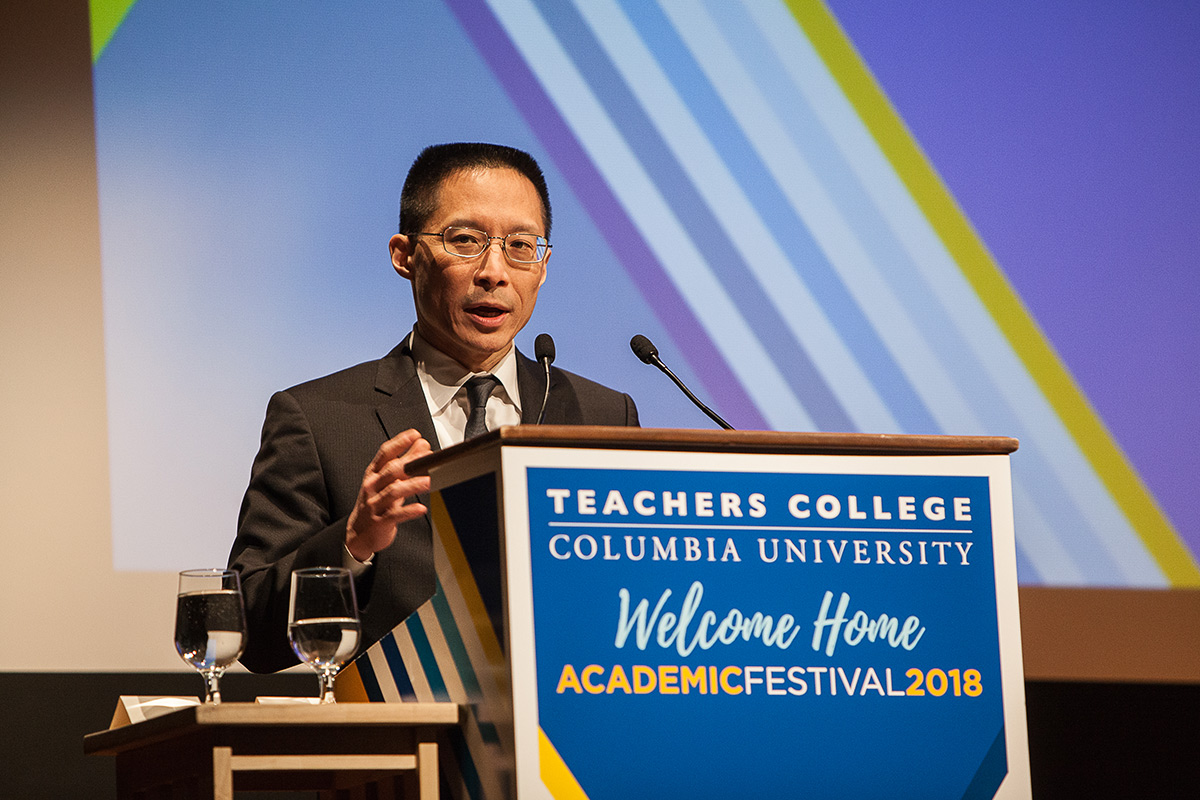
CIVICS TEACHER Liu called for educators to unleash students' power in the service of democracy.
Racism was also a focus of a discussion dedicated to the late TC psychologist Morton Deutsch, who help create the field of conflict resolution. James Jones, Professor Emeritus and Director of the Center for the Study of Diversity to James M. Jones, Professor Emeritus at the University of Delaware’s College of Arts & Sciences, spoke on the importance of active cross-cultural recognition and engagement in addressing persistent racism in our society. “Color-blindness is an excuse to privilege individualism and to marginalize collective action,” said Jones, who received this year’s .
LEADING BY EXAMPLE Hampton rose to prominence after enduring silence and ostracism from white high school classmates.
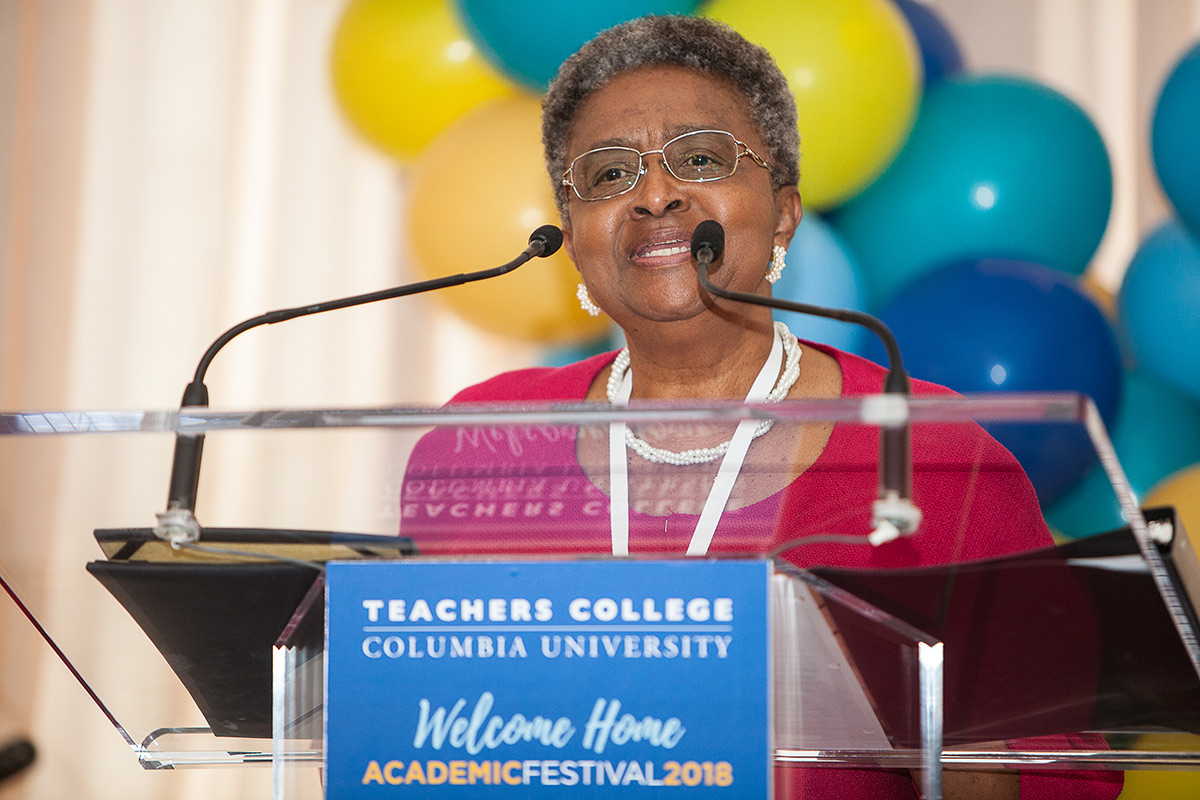
LEADING BY EXAMPLE Hampton rose to prominence after enduring silence and ostracism from white high school classmates.
Blindness itself was also part of the day’s discussions. In a panel titled, “Failure, Adaptabilty, and Success,” Bradford Manning (M.A. ’10), co-founder of the apparel company Two Blind Brothers, which channels its profits into research on curing blindness, shared his own experience in managing and adapting to his loss of sight. Manning also received TC’s Early Career Award.
Summing up Academic Festival, Bill Gaudelli, Professor of Social Studies Education, said it captured the notion of interdependence, which is “a fundamental part of what it means to be on the planet as a single species.”
SEEING CLEARLY Jones called rhetoric invoking a "color-blind" society "an excuse to privilege individualism."
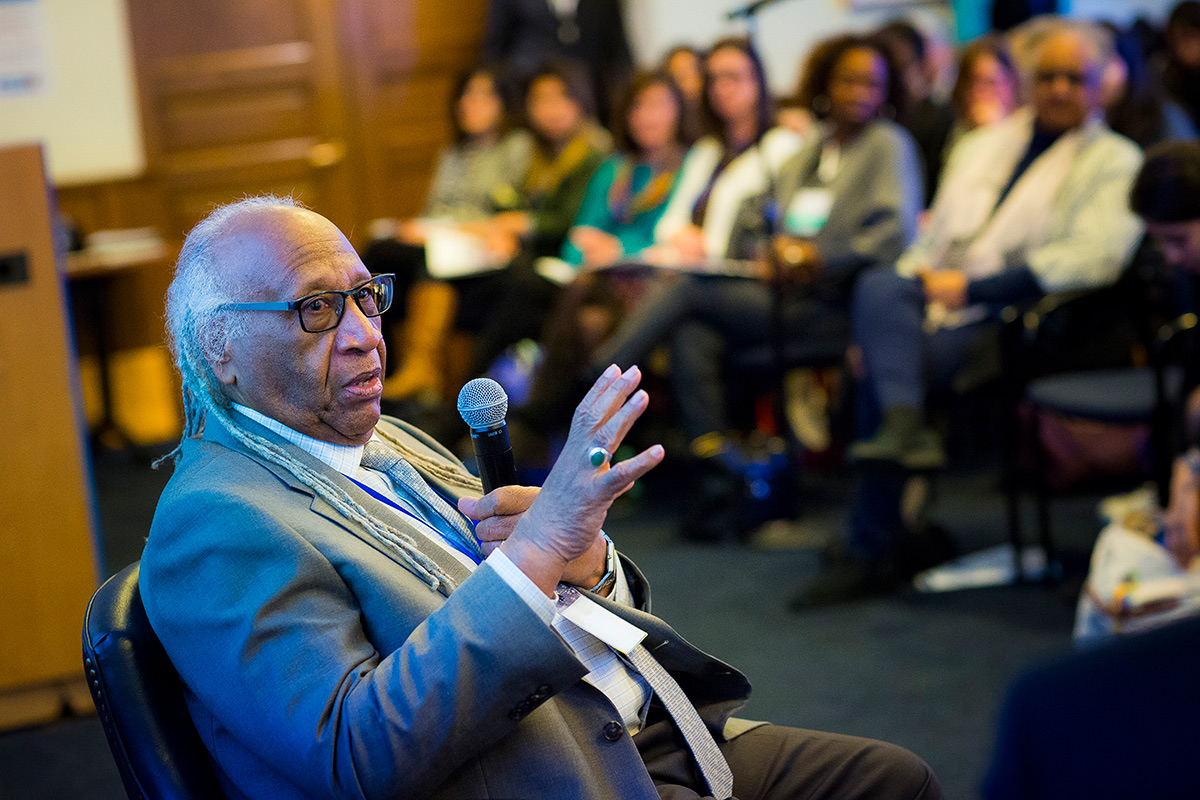
SEEING CLEARLY Jones called rhetoric invoking a "color-blind" society "an excuse to privilege individualism."
As always, TC’s current students figured prominently in Academic Festival, too. The day concluded with a poster session presenting cutting-edge research by students in all 10 of the College’s departments. Lisa McDonald, a doctoral student in Science Education, was awarded the best poster prize, earning a tuition credit for her research on “The Role of Children’s Racial Identity and its Impact on Science Education,” while the People’s Choice award went to C.J. Reilly, a master’s degree student in Art & Art Education, for his work on “STEAM-Powered Food Security.”
BEST IN SHOW Doctoral student Lisa McDonald (right) won the student research poster competition.
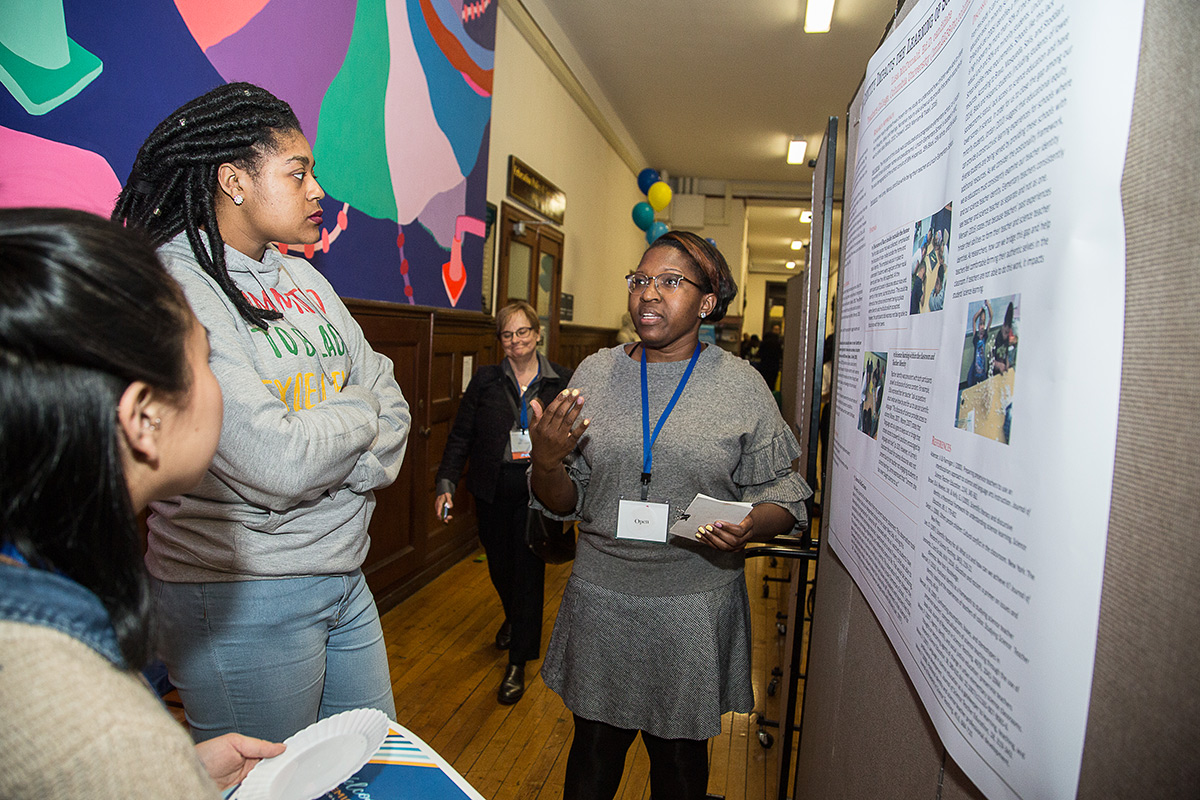
BEST IN SHOW Doctoral student Lisa McDonald (right) won the student research poster competition.
It was, in short, a day that united the entire TC community – and that, too, was right in keeping with Fuhrman’s outlook. Or as Bill Gaudelli, Professor of Social Sciences and Education, put it, interdependence, is “a fundamental part of what it means to be on the planet as a single species.” He quoted Dr. Martin Luther King, Jr.: “We are tied together in a single garment of destiny, caught in an inescapable network of mutuality.” – Siddhartha Mitter
Distinguished, Accomplished and Diverse: TC’s 2018 Alumni Honorees
Student Research Poster Competition